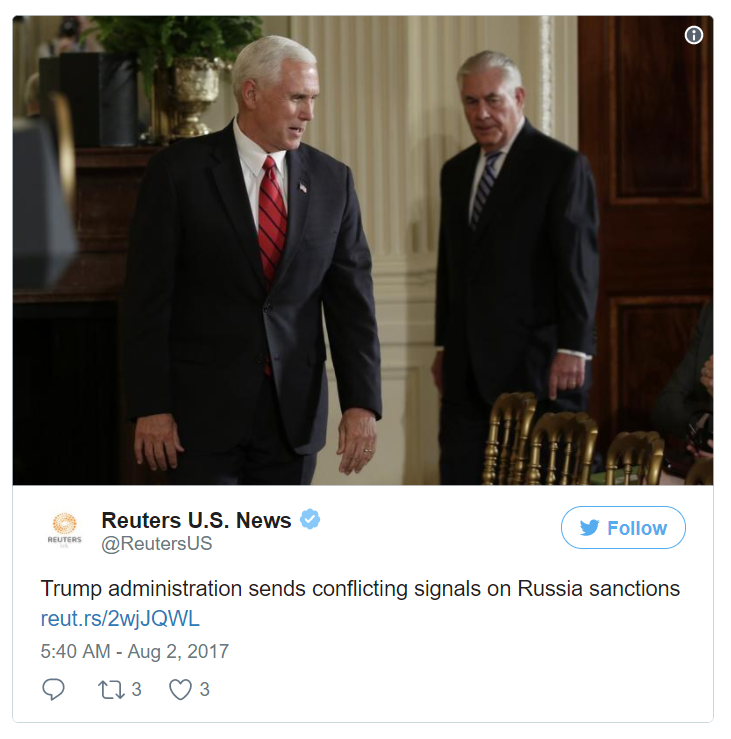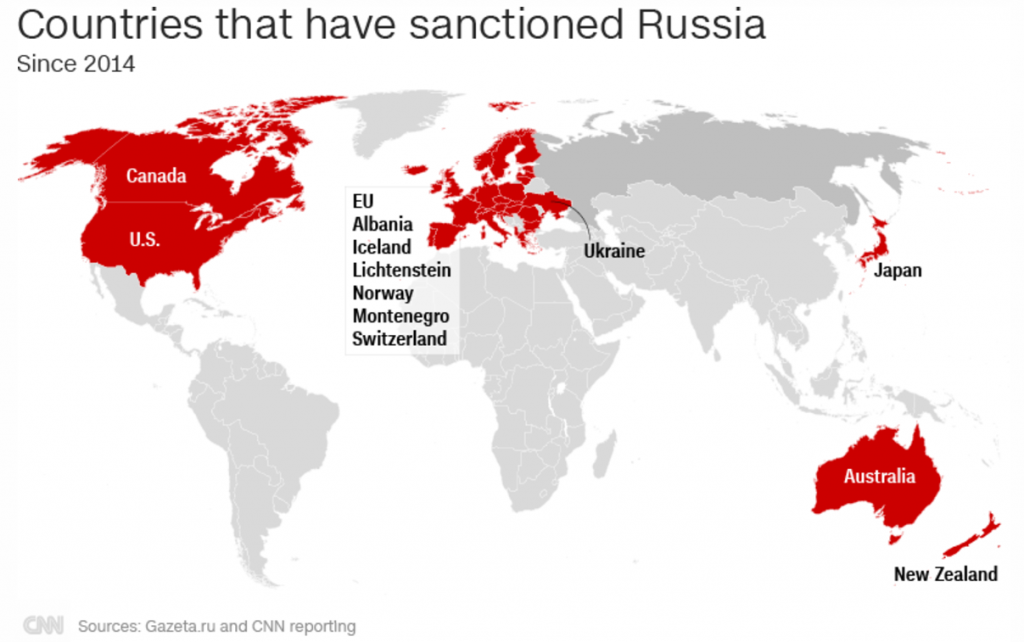Typical and Nontrivial Goals of New Sanctions Against Russia
In
Log in if you are already registered
Six months of fighting for a new package of targeted sanctions against Russia ended up on August 2 with the President of the United States Donald Trump signing the "The Countering America’s Adversaries Through Sanctions Act" in the edition approved by the Senate on July 25.
The overwhelming majority of Russian experts and politicians agreed in advance that the US president would not use his power of veto. The Kremlin has also explained mirror sanctions imposition against the United States on July 28 with the very same argument that technically a question about this bill had been decided. Indeed, to impose a veto would be a useless act, as in the current situation of bipartite support it could be overridden, and it would be an unreasonable act because it could damage Trump image, while he is already struggling with accusations of his ties with Moscow.

Source: Facebook
Russia had expected Trump to sign the bill. With such level of confidence that even major national media had published a wrong interpretation of a statement made by an American official and had reported on the fact of signing a day before the event actually took place. In contrast, Western media were full of comments intriguing global audiences until the very end. President would be “betraying democracy” if he vetoes it, Senator Lindsey Graham, one of the most active supporters of sanctions, warned Trump on screens. Efforts to make sanctions permanent are leading "to spiral downward into the abyss of russophobia", the Congress of Russian Americans argued in its letter to the president. "I personally would be surprised if he doesn't veto it, and that sets up a big fight," Rebecca Berg from CNN has commented on the issue. His veto “risks the humiliating possibility of Congress overturning it” Holly Ellyatt from CNBC has written. Official representatives of the White House also heated these debates. "Trump's decision is unpredictable", "he may veto the sanctions and negotiate an even tougher deal against the Russians," Anthony Scaramucci, Communications Director for 10 days, said in his unique manner. "Trump administration sends conflicting signals," Reuters concluded by comparing recent statements by Mike Pence and Rex Tillerson.

Obviously, these flashes and discordances of political discourse reflect far more serious questions on which international community will have to find answers. It is already clear that new sanctions will become a significant precedent not only in the history of international relations but also in the evolution of foreign policy tools. Of course, not of the same value as measures against Iraq in 1990, which imposition was a tipping point of "comprehensive sanctions" era, but, nevertheless, it is a sanctions regime that calls for a revision of our knowledge about means of political and economic coercion. Perhaps, we could even work out a new understanding of the international sanctions phenomenon, because, as we know, in the nowadays accepted definition, their purpose can be either to punish external political actors for deviant behavior or to influence their actions. Here we emphasize the "external" and "political". However, seems that these particular sanctions are not limited to these typical goals for restrictive measures. There are others, quite nontrivial ones this time.
If we look at the context and content of this new bill, as recommended by Francesco Guimelli[1], one of the leading specialists in a classification of sanctions according to their objectives, we will see a complicated case conflicting with theory. "Secretary Tillerson has to prove to senators the "changing trajectory” of U.S.-Russian relations or we will push forward with sanctions" chairman of the Senate Foreign Relations Committee Bob Corker explained in May and that fully corresponds to our usual expectations of a sanctions regime initiation. The declared list of official reasons for new measures (which are interference in the US elections in 2016, the Crimea and the Minsk agreements issues, support for the government of Syria) logically leads to presented in literature generalized types of sanctions goals, such as “to punish”, “to influence”, “to signal”. However, to a specific list of prospective goals and tasks, this classification suits not so well.
Surely, understanding of goals and the context of changes in the sanctions regime against Russia is very important while developing a plan of next actions by our country. The bill is really controversial: it raises a lot of questions both in its adoption process and in its content. In particular, the US allies in Europe paid special attention to sections 232 and 257, describing measures with respect to the development of pipelines in the Russian Federation and Ukrainian energy security. There is nothing new in a fact that US sanctions against other countries are tightly tied to the commercial interests of American companies. For those, who were surprised by the economic background of the law, it might be interesting to read Ernest H. Preeg's book "Feeling Good or Doing Good with Sanctions,"[2] published almost 20 years ago.
One of the central themes of aforementioned work is an explanation of why and how business in the US should interact with the state when it comes to securing national interests with unilateral restrictive measures. So, an unconcealed task to “prioritize the export of United States energy resources in order to create American jobs, help United States allies and partners, and strengthen United States foreign policy" falls within US diplomacy traditions. Note also that approach "America First" is clearly manifested in this sequence. However, the uneasy reaction of the EU to the bill was probably caused by US insolent attempt to decide for European countries when and how they should ensure their energy security as if the EU states do not have their own plans for energy sector diversification or as if their strategies can be ignored by the USA.
Apparently, it should be noted that economic tasks set out by the bill signed by Trump are fully corresponding to his election campaign promises. It is unlikely that these sanctions came as a result of a scenario "entirely conceived within the Trump administration," nevertheless we should think about it. In general, it is logical that no matter how good personal relations between leaders are, the US president duty is to take care of national interests of his country first, not those of Russia, and he is responsible to provide economic and political stability in the USA.
Meanwhile, another extremely interesting discussion taking place right now is that new sanctions bill does not only aiming at external political targets but also at domestic ones. Very nontypical, to put it mildly. In the TIES dataset, which contains descriptions of several hundred sanctions regimes, there is no case coded with a purpose to harm a national leader of a sender state. It sounds strange according to the theory and accepted classifications of sanctions, but what if this bill also aimed at weakening Trump? After all, it does contain measures to limit the US president power in foreign affairs and has a very clear signal function. And what if the veto was not just a matter of pride, but a risk of impeachment? In this case, Russia should consider which type of response will help Trump opponents and think if we need it. It is possible, of course, to be disappointed in Trump, since he "has lost the initiative to his opponents", it is even possible to accuse him to be "a weak politician" and "stop caring about how he will be treated inside America," but such proposals do not suit diplomacy of a country that playing a significant role in the international arena.
We must rationally assess our prospects and definitely not to rush from the extreme to the extreme. Not now when possible goals of the new bill have already been outlined and up to be implemented. To prevent achieving those aims that directly put pressure on Russia, we should not focus only on mirror sanctions or other negative measures in response - we must look wider and use other opportunities. It is necessary to analyze in detail changes caused by the bill as there is a possibility that some of the measures can be bypassed. Besides, in a situation when Germany offers new sanctions against Russia because of the Siemens conflict, we can't miss our chance to improve relations with the EU countries disappointed by the United States behavior. Strengthening of ties with China is not a panacea, this state also uses tools of economic coercion and restrictive measures, moreover, hidden ones. The situation with Russian sanctions has indeed become more complicated, but not hopeless. And in these new conditions, less emotions and more pragmatics are needed.

[1] Giumelli F. 2012. Coercing, Constraining and Signalling: Explaining and Understanding International Sanctions after the end of the Cold War. Colchester: European Consortium for Political Research Press. 200 pp.
[2] Preeg E.H. 1999. Feeling Good or Doing Good with Sanctions: Unilateral Economic Sanctions and the US National Interest. Washington, D.C.: Center for Strategic & International studies. 264 pp.




